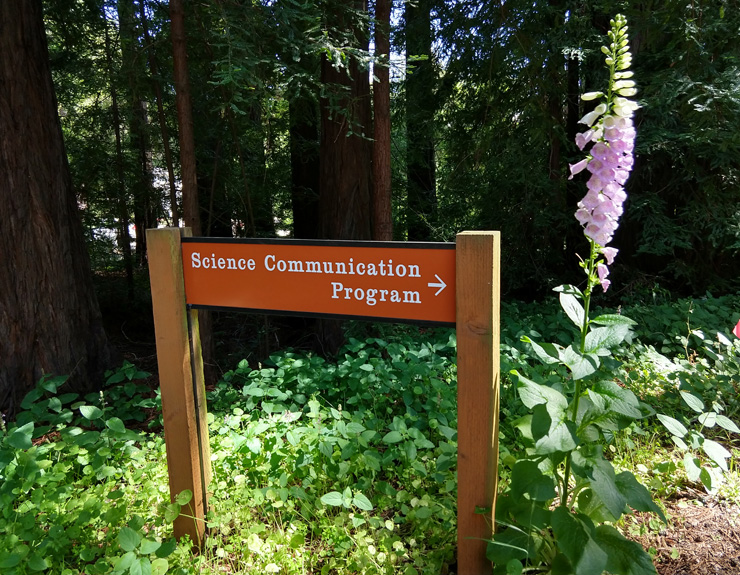Last Updated on January 18, 2023
Overview
University of California, Santa Cruz / Program in Science Communication is located in Santa Cruz, CA, in a small setting.
Degrees & Awards
Degrees Offered
| Degree | Concentration | Sub-concentration |
|---|---|---|
| (Certificate) |
Degrees Awarded
| Degree | Number Awarded |
|---|---|
| Other Advanced Degrees | 9 |
Earning Your Degree
| Part-time study available? | No |
| Evening/weekend programs available? | No |
| Terminal master’s degree available? | No |
Admissions
Acceptance Rate
20Applied13Accepted10Enrolled65%
Applying
70Application Fee – Domestic 90Application Fee – InternationalYesElectronic
applications accepted?
Application Deadlines
| Type | Domestic | International | Priority date |
|---|---|---|---|
| Fall deadline | April 1st | April 1st | No |
Entrance Requirements
| Exam | Details | |
|---|---|---|
| Additional Entrance Requirements | Bachelor’s degree in science |
International Students
| Exam | Details | |
|---|---|---|
| TOEFL: Required | TOEFL Paper score: 550 TOEFL IBT score: 83 | Improve your score!Practice |
| IELTS: Recommended | IELTS Paper score: 8 |
About the Program

Outside our home at UCSC’s Kresge College. Credit: Emma Hiolski ’17
“The UCSC Science Communication Program has set a high bar for training standards and the highest level of quality in science journalism.”
—from a 2013 external review of the program
Do you enjoy explaining your work, and science in general, to non-scientist friends more than you like working in the lab?
The women and men who popularize science enjoy a career that satisfies their intellectual restlessness. They report on science trends, discoveries, personalities, and policies, often from the lab or in the field. Science writers choose from myriad career options: online or print journalism; staff writing at university news offices, federal agencies, national labs, museums, and zoos; and multimedia work on the Internet and in radio.
The science writing program at UC Santa Cruz has produced professional science writers since 1981. The program is one academic year long, focusing entirely on practical training through rigorous coursework and diverse internships. It’s the only graduate science writing program in the U.S. that requires a degree in science and experience in research.
Our alumni, more than 350 strong, work as reporters and editors at the nation’s top science magazines, online news services, research agencies, universities, and medical centers. About half of our graduates freelance, mainly to live where they wish and to cover the science that captivates them.
The Science Communication Program has received generous support for scholarships and instruction from the Chan Zuckerberg Initiative, the Hearst Foundations, the Heising-Simons Foundation, the David and Dana Loury Foundation, Roche Molecular Diagnostics, the John S. and James L. Knight Foundation, the Helen and Will Webster Foundation and numerous private donors.
WHAT WE DO
“The Science Communication Program is widely regarded as one of the best science writing programs in the world; we believe that reputation is well deserved. Its graduates are making strong contributions to the public understanding of science.”
—from a 2006 external review of the program
The Science Communication Program bestows a master’s degree. The program:
- consists of nine months of coursework and a final summer internship
- requires part-time professional internships throughout the academic year
- does not require a thesis
- offers practical training with professional journalists and editors as instructors
- emphasizes news, long-form writing, and multimedia skills, with an eye toward substantive reporting on research and policy
- features small class sizes (10 students) in every course, ensuring extensive feedback from lecturers
- stresses original writing and editing for the public, rather than theory and critique
- subjects all projects to rigorous editing at the highest standards, with some peer review by students
Our students practice science writing as a fine art as well as a craft. They emerge from their year in Santa Cruz with dozens of published stories, a broad set of journalistic skills, and distinct voices as writers
